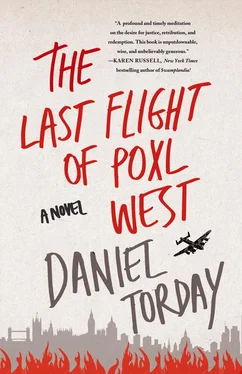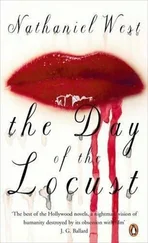I took a cigarette from my packet and smoked it at an acceptable pace, then stubbed it out in the ashtray on her table. I thanked Fräulein Van Leben for her hospitality. If she was to remember something further about the Brauns or if she were to learn more of their fate, or the fates of my friends, I told her I would appreciate it if she’d let me know. I provided her with the address of the hotel where I would be staying, and of the café on Scheepstimmermanslaan where I could be found during the days.
As I was leaving, Fräulein Van Leben stopped me. She said that while she didn’t know what she could tell me now, she did have an idea, of how she might unearth something, and that I should leave her information regarding my lodgings.
From Fräulein Van Leben’s I returned to my hotel room. The gaping hole in the block across from her house kept arising in mind, and alongside it an image of those brown gashes Glynnis and I had observed in the countryside outside of London. Maybe I had been wrong about the image that appears in the mirror. Walking around those old streets by the harbor, all my brain could do was imagine Françoise walking those same streets amid mortal fear of Luftwaffe bombs. I’d left Rotterdam without saying a proper good-bye. I’d left London for training and never seen Glynnis again. I’d left Leitmeritz without bidding a proper good-bye to my mother. My last letter from my parents had come years earlier. I had not attended a funeral since I’d left Leitmeritz. I had only acted and acted and acted and acted, some delusional anti-Hamlet acting instead of thinking. And now every one of my thoughts was retrospective, as if I’d set out on a new life with my gaze cast ever backward.
2.
I rose early each morning the next week and sat at the old café. There were new owners. Now they called it Das Amsterdam. My former employers had relocated to the countryside along the Austrian border. They’d left the place to some relations, who promised to pass along my regards, and news of my having outlasted the Nazi aggression. I sat and smoked, and during those moments, I thought perhaps love’s loss would be my soul’s demise. For so long I’d proceeded through that period feeling as if I’d been acted upon: The Anschluss had led me away from my home; Luftwaffe attacks had led me to the seat of a bomber. But I’d acted, too, hadn’t I? It had been my decision to leave Rotterdam. I’d wronged Françoise, and now this was the closest I would come to finding her again: sitting in the city where she and I had met. Living as close as I could to that memory, buffeted only by the evidence of Luftwaffe bombs.
My third day in Rotterdam, just as I was finishing my morning coffee, a tall girl with dark hair stopped before my table. Standing before me was a beautiful woman, maybe seventeen. She looked at least five years older; girls at that age are truly already women. Her black hair fell to the middle of her back, curled into loose ringlets, and her skin was tawny, like that of one who has spent time in the sun.
“You are Poxl Weisberg,” she said. “You knew my mother.”
And so Heidi Braun sat down at the café with me. This apparition, who only years earlier I’d known as a preadolescent, was Françoise’s daughter. She’d found me. Fräuleïn Van Leben clearly hadn’t told me she knew of Heidi but then had contacted her. I could see myself through that old woman’s eyes in a flash — and in Françoise’s. Villain. Poxl West, the villain in what he felt was his own tragedy. But here Heidi was, and here was the beginning of my chance for redemption, however meager. As she sat before me, speaking, I was struck most by the way she represented how much time had passed. I’d grown older, I suppose, but I was still the same height, same build, same size. Heidi had been a girl when last I saw her. Now she carried herself like a woman.
As I marveled at the change in her, Heidi explained that by the time she was fifteen she found her own way to utilize the calling of both her mother and her grandmother. The allure of her youth and of her exoticism would never not be desirable. For her whole life she’d been granted a greater ease of living through her adoptive parents, but when Nazi pressure arrived at their doorstep, even the Brauns couldn’t keep Heidi’s impure blood from Nazi scrutiny. It was in her papers.
Many like her were sent to Poland.
But Heidi was able to use her feminine power to her advantage. She found a Nazi soldier to look after her — an ineffectual soldier who ensured her safety, kept her in Rotterdam, but whom she always kept at arm’s length, the relationship so clandestine that even her friends could only whisper of the mechanism of her survival, leaving her safe from the stigma and repercussions of being deemed a collaborator like little Suse back in Leitmeritz. By the time the Wermacht was expelled from their city, she’d been working three years in a store that sold fine paper. The occupying officers had come to depend upon that paper when they needed to send word back to their women at home. She had learned to print, and while such fripperies were hardly useful to the civilian population now, she claimed she could keep at this for some time ahead.
“But what of you, Poxl?” she said.
“What of me?” I said. “What of your mother?”
Heidi took a minute to answer. Her affect was not that of a seventeen-year-old girl — there was nothing petulant, instead only a slow air of resignation. For the second time since she’d come up to me, I now recognized something familiar in Heidi, only it wasn’t her resemblance to her mother this time. It was a moment of looking at her and seeing, reflected back at me, myself. Hers was a resignation I myself had carried upon embarking on my new life alone.
“Only the future holds the answer to that question, Mr. Weisberg,” Heidi said. A strange ambiguous look came across her face. “My mother has been living with my stepfather in London for almost as along as you.”
Françoise, Heidi explained, had anticipated the fate that might befall a woman like herself, having seen firsthand the destruction wrought by the Luftwaffe. She’d walked the streets in terror in the days after the bombing. Not two months after Nazi bombs destroyed half of Rotterdam, some Brit had paid her way, to London. She had stewed away on a freighter I told Heidi this departure mirrored precisely my departure from Rotterdam.
“Your disappearance,” Heidi said. “No one knew where you’d gone.” Now I watched as the skin on her lips bunched together. I recognized this action as I’d seen it in her mother that day I failed to grasp her explanation of how muscle memory worked in her hands. That muscle memory was now working on her daughter’s mouth: disappointment drawn on her very lips.
“You must understand,” I said. “My father had gotten me passage to London, and I was so confused in those days about what I was to your— I had seen that— I just.”
“Do you need something more to drink?” Heidi said. I started to say something more and then stopped, not knowing what I would even say. We sat in silence until Heidi spoke again.
She told me more about her time in Rotterdam after the war. For the rest of that afternoon I found some way, as I had with Fräulein Van Leben, to avoid divulging any of the details of my life since leaving Rotterdam. When I got Heidi talking again I recognized that embedded within Françoise’s resurrection, like a fissure in a rock which is over time eroded to sand, was the fact that she was now married. Heidi had kept up with her mother by post, but in the chaos of the last years of the war, she had kept in touch poorly. I took down Heidi’s information, and on that same paper she included the most important information I would ever receive — Françoise’s London address:
Читать дальше












